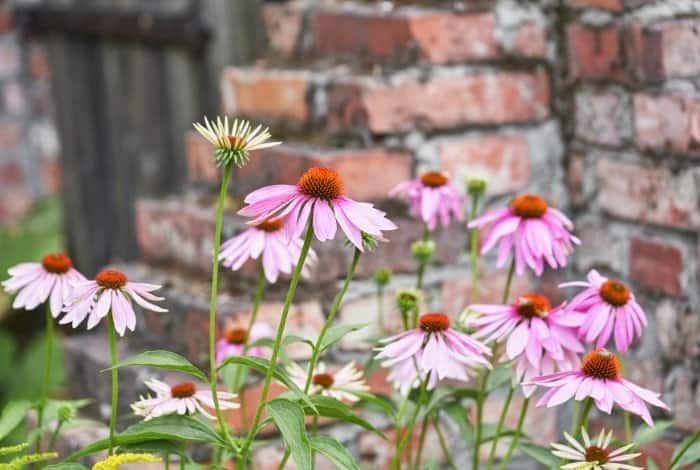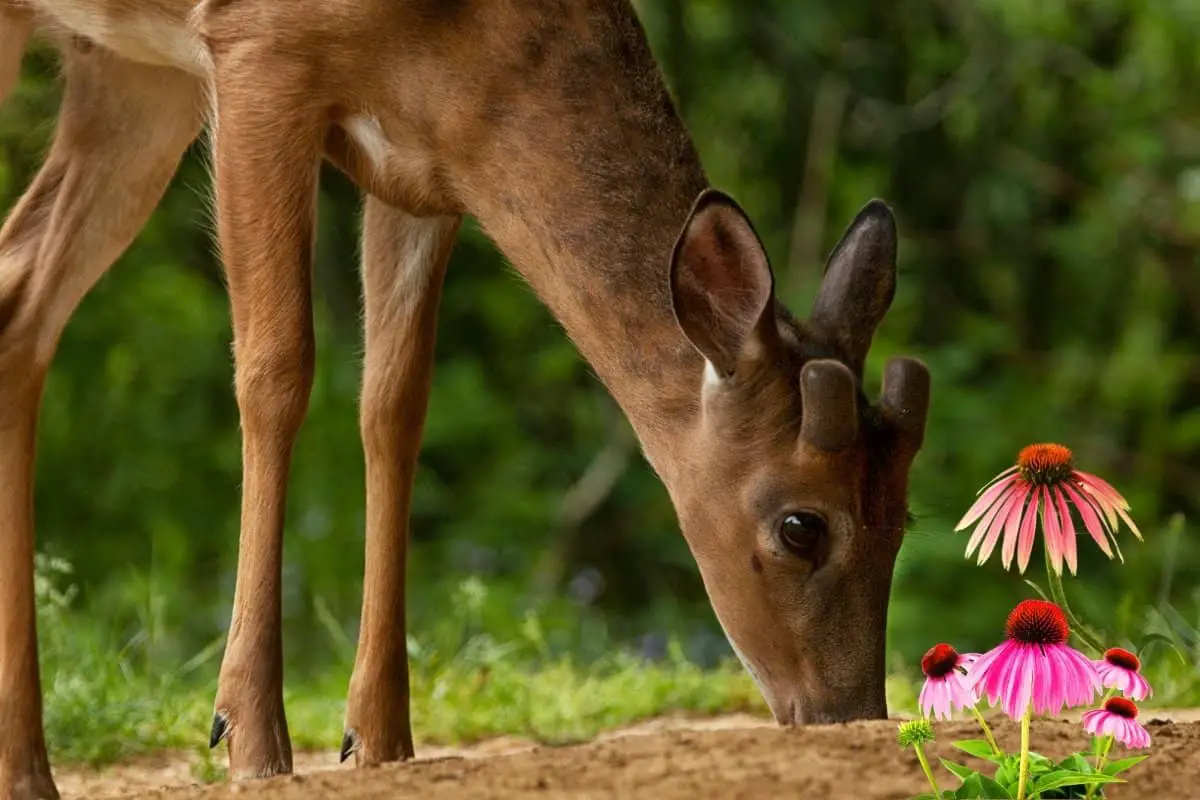Last Updated on January 17, 2022 by
If you live in an area with a high deer population, you may wonder do deer eat coneflowers or is it fine to grow them.
Coneflowers are a genus of perennial flowering plants that are native to the Central and Eastern parts of the United States. However, they are propagated all over the United States due to their landscaping appeal.
These flowers have a spiny, mounded center. The center is surrounded by drooping petals of yellow, purple, pink, white, or mixed ray petals. Coneflowers thrive in full sun to partial shade and moist well-draining soils. When mature, they become drought tolerant and versatile plants for a variety of climatic conditions.
Deer are the curse of many gardeners. A hungry deer can level an entire flowerbed within a very short time. They leave nothing but stalks that show there was a plant growing there once.
Why Do Deer Eat Plants?
Deer require protein, nitrogen, and fiber to maintain their health. They store nitrogen in small amounts thus need to replenish it from time to time. Green plants provide nitrogen plus 1/3 of water that a deer requires each day.
Herbaceous plants provide the right fiber while others provide protein for optimal growth in an animal. Because of this, deer will graze on these herbaceous plants as often especially during the peak growing seasons.
Plants that Deers Like to Eat
Some plants are identified as deer candy because they are often eaten away by these animals. Some of these plants include the fir, arborvitae, daylilies, hostas, and English Ivy. Deer seems to prefer plants that are fertilized to those that are not.
Deer do not eat poisonous plants like foxgloves, daffodils, and poppies. It also avoids fragrant plants that have a strong scent like sage, lavender, ornamental salvias, peonies, and bearded irises.
Are Coneflowers Deer-resistant?
Universities that have conducted researches have concluded that coneflowers are deer-resistant plants. However, the disclaimer is a hungry deer will eat almost anything as long as it’s not poison or too scented. They prefer to eat highly fertilized and well-watered plants for their nitrogen and protein. They do not eat the native plants growing in the natural environment.
To be honest, there are no deer-proof plants! If food is scarce, deer will eat almost anything. October to February is the month that the deer browses heavily on gardens. With this knowledge, it’s best to grow plants that are not deer’s top choice.
Deer Repellent – Bobbex | Ready-To-Use Deer Deterrent Spray
Please note that even what would be called resistant varieties are vulnerable in the first weeks after planting. At this point, their leaf tissue is nitrogen-rich and tender. If you are facing major deer problems, we recommend spraying deer repellant 3-4 weeks after planting. This will keep deer from nibbling on the young plants.
Keeping Deers Away
- If you notice that deer are nibbling on your stalks, leaves, or foliage of your coneflowers, plant some companion plants that deter them away.
- Surround your coneflowers with plants that have a strong scent, fuzzy or prickly leaves with a bitter taste. These will keep the deer away from your cherished blooms.
- Plants that are known to offend the delicate sensibility of a deer include lavender, chives, roses, and clematis. This is not a limited list of plants that deter deer. With a little more research you can add to this list.
- Deer also decides to go after coneflower depending on the season they are growing. In spring they eat coneflowers after a scarcity of food in winter. They eat ravenously without prejudice anything they come across because they are hungry. You can protect your coneflowers by putting a chicken wire cage until summer approaches. During summer, deer get to choose what to eat from a variety of other plants thriving under the sun.
Will Coneflowers Grow Back after Deer Eat Them?
Coneflowers can grow back after deer eat them up. Here are some helpful tips to use after a destructive visit from deer.
- Prune all the damaged stems and leaves
- Fertilize them or add compost top dressing around the plant to encourage new growth
- Keep an eye on the plant and offer additional pruning, fertilizing, and watering as needful

Following these tips gives you a better chance of growing and blooming again in the coming year.
Coneflowers Deer Resistant
The only known way to keep deer out of your garden completely is by erecting an 8-foot fence. Better still erect a smaller fence with an electric wire at the top. Deer will easily jump a normal garden fence but adding electric wire will keep them out of the garden.
FAQs
Do Deer Eat Coneflowers?
There are many articles that have been written on the topic, but there has not been any solid evidence to show that deer eat these flowers.
There are a few articles where people say that they have seen deer eating these kinds of flowers, but there was no real proof in any of the pictures. Deer do seem like they like to eat other types of flowers, so it could be possible.
Do Deer Eat Coneflowers? As the name suggests, deer do not eat coneflowers. T
However, it is thought that the flowers of this plant are toxic to deer; they can even cause death if eaten. Generally speaking deer cannot eat flowers because deer have a different type of diet.
How do I keep deer from eating my coneflowers?
The first thing you should do is make sure that the plants are not near a water source. If they are, the deer could be attracted to them and they probably won't leave because they drink from it often.
Deer are attracted to coneflowers because they are high in protein. The most effective ways to keep deer away is to either plant them too deep, or use a deer repellent spray.
Another thing that can help is installing a fence around your garden. The fencing needs to be at least three feet high because deer can jump up this high and then eat the plants that are on top of it. You should also install a wire mesh around the posts so that the deer cannot pull them down or push them over with their hooves.
What flowers will deer Absolutely not eat?
A common misconception is that deer eat any and all plants they come across. Deer, like other animals, have a strict diet and it can vary depending on the season and their geographical location. Deer primarily eat trees and shrubs, but they also eat grasses, roots, leaves and flowers.
Deer are very selective when it comes to food. A deer will not eat any flowers that are not native to the region it lives in. This is because they have adapted to the environment through evolution and have been able to find the food they need most by looking for flowers that they can eat.
In regions with a lot of native flowers, deer will avoid eating anything else. In places with few species of flowers, deer will try anything just to survive.
The only flowers they absolutely won’t eat are tulips, roses, and any kind of flower with scent to it.
Some plants are highly toxic, and deer will actively avoid them. For example, a deer would not eat a Castor bean plant because it is so poisonous. They also don’t eat plants that have thorns or spines because those can injure them. And they certainly won’t eat plants with potent smells because those could make them sick or even kill them if they consume enough of it.
Caroline is a gardener who loves to get down to the nitty–gritty of gardening. She proudly proclaims herself as a ‘dirt worshipper‘ and can often be found deep in the garden, covered in soil and singing to her plants. As a self–proclaimed ‘plant whisperer‘, Caroline believes that plants need love and attention just like any other living thing, and she loves to give them both. When she‘s not tending to her garden, you can often find her researching the latest gardening trends, or teaching others how to make their gardens thrive



